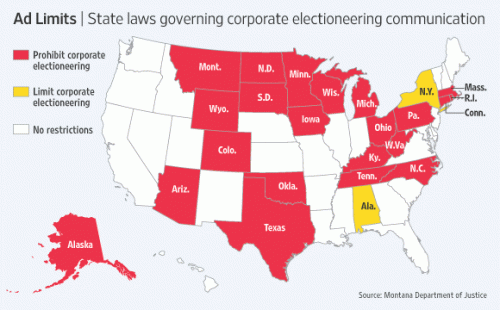Updated January 21, 2010
See our comprehensive introduction to Citizens United for background
Court Opinions (Issued January 20, 2010)
- Majority (5-4) Opinion
- Stevens’ Dissenting Opinion (joined by Ginsburg, Breyer, Sotomayor)
- Highlights, sans citations, excerpted here
- Concurring opinions by Roberts — Scalia — Thomas (Dissenting in part)
Notable Analysis and Commentary
There were 2000+ articles published within 24 hours of the Court’s announcement, this is just a sampling.
- Election law scholar Rick Hasen analyzed the case for Slate. For a comprehensive pre-ruling overview, see his case preview.
- Brenda Wright, Daniel Greenwood and Jeffrey Clements all contributed notable blog posts for the American Constitution Society.
- Ciara Torres-Spelliscy wrote on the potential for impeding corporate dominance by requiring shareholder approval for political spending.
- Dahlia Lithwick reported for Salon.
- The New York Times editorialized against the ruling.
Pre-ruling coverage
- The Wall St Journal noticed Justice Sotomayor’s critique of corporate personhood during oral argument
- Corporations Are Not People by Jamie Raskin (NPR)
- Supreme Court to Hear Key Case… by Meg White (Buzzflash)
- The Real Court Radicals by E.J. Dionne, Jr., Washington Post column
- Keep My Investments Out Of Politics by Ciara Torres-Spelliscy in Forbes magazine
- A Century-Old Principle: Keep Corporate Money Out of Elections by Adam Cohen, NY Times
Notable Quotes
“The bottom line is, the Supreme Court has just predetermined the winners of next November’s election. It won’t be the Republican or the Democrats and it won’t be the American people; it will be Corporate America.” –Senator Charles Schumer
“While American democracy is imperfect, few outside the majority of this Court would have thought its flaws included a dearth of corporate money in politics.” –Justice John Paul Stevens’ dissent
“Five justices were unhappy with the limited nature of the case before us, so they changed the case to give themselves an opportunity to change the law.” — Adam Liptak, Supreme Court reporter and commnetator at NY Times

